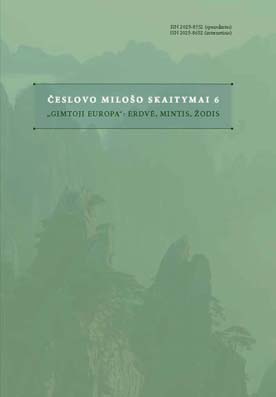Lietuvių migrantų proza: lietuviško tapatumo ženklai K. Barėno „dvidešimt viena veronika“ ir A. Fominos „Mes vakar buvom saloje“
The Signs of Lithuanian Identity in the Novels by Lithuanian Migrant Writers: K. Barėnas’ “Twenty-One Veronica” and A. Fomina’s “Yesterday We Were on
Author(s): Justina PetrulionytėSubject(s): Literary Texts
Published by: Vytauto Didžiojo Universitetas
Keywords: Narrative space; place; container; description; identity; emigrant; migrant
Summary/Abstract: The article discusses the issue of the represented space in the narratives by two Lithuanian authors – Kazimieras Barėnas (1907-2006), who emigrated to England in 1947 and lived there till the end of his life, and Aleksandra Fomina (b. 1981), who lived in England for some time. Postcolonial approach to text allows shedding light on the images, which appear in both authors’ novels, as possible signs of Lithuanian culture and problematic (e)migrant identity. The woman protagonists of the novels – Veronika and Ūla – could be called postcolonial (postsoviet) subjects: both of them are from a small (post)occupied country, but locating themselves figuratively in the spaces, which symbolize power – in the imaginary royal castle (in Barėnas’ “Twenty-One Veronica”) and the tower (in Fomina’s “Yesterday We Were on the Island”), they invert the positions of power and subordination. The images of castle and tower create an opposition to the metonymic image of (ruined or unfinished to be build) Lithuanian farmhouse. Although the periods and forms of the Lithuanian (e)migration represented in the novels are different, both novels reflect the (e)migrant’s homelessness (through the depiction of Veronika living in DP camp and Ūla – in Squatter Houses) and her intense need to have a home, as well as emigrant’s loneliness, lack of relation with community, and the experiences of working person in foreign country. In both novels the reoccurring images of buses, trains, stations, path, threshold, window, and fences mark the (e)migrant’s transitive state and liminality.
Journal: Česlovo Milošo skaitymai
- Issue Year: 2013
- Issue No: 6
- Page Range: 88-97
- Page Count: 10
- Language: Lithuanian

